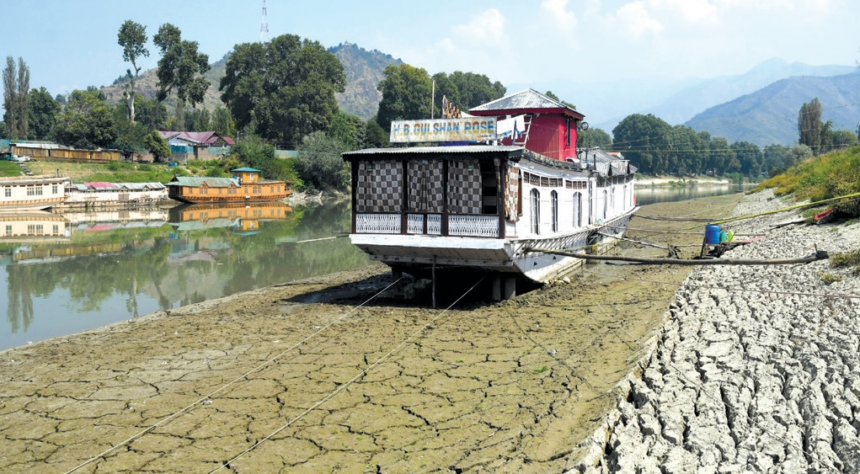Climate change is a global challenge for the sustainable development of all the countries in the world. Over the years it has become a defining crisis threatening the survival of human life. Climate change has brought terrible implications in every part of the planet earth. According to the United Nations, the extraction of coal, oil, and gas releases billions of tonnes of CO2 into the atmosphere every year. Also, human activity is producing record-high levels of greenhouse gas emissions, with no indications of slowing down in the future. The impacts of climate change need special attention and efforts are needed in negotiating a new global climate change crisis that can help in the preservation of the earth and its environment.
Climate change is already impacting Kashmir in profound ways, from unpredictable weather patterns and melting glaciers to increased instances of natural disasters such as floods and landslides. These changes not only endanger the delicate ecological balance of our region but also have far-reaching consequences for our communities, economy, and way of life. The impacts of climate change are manifesting here with alarming intensity, threatening not only the environment but also the livelihoods and well-being of its inhabitants. It is imperative that we take decisive action to mitigate these effects and preserve this unique region for future generations.
Kashmir’s distinctive geography, characterized by its mountainous terrain and lush valleys, makes it particularly vulnerable to climate change. Rising temperatures are accelerating the melting of glaciers, which are crucial sources of water for the valley’s rivers and agriculture. This not only jeopardizes water security but also increases the risk of flash floods and landslides. Additionally, the changing climate is disrupting the traditional patterns of snowfall and rainfall, adversely affecting agriculture, which is the backbone of the local economy.
Addressing this crisis requires a multi-faceted approach. Firstly, there must be a concerted effort to enhance the resilience of local communities through sustainable agricultural practices. Introducing drought-resistant crops and promoting organic farming can help mitigate the adverse effects of climate variability. Additionally, integrating modern technologies such as precision agriculture can optimize resource use and improve crop yields.
Reforestation and afforestation efforts are also crucial. The valley’s forests act as natural carbon sinks, absorbing carbon dioxide from the atmosphere. Protecting existing forests from deforestation and engaging in large-scale tree planting can significantly offset greenhouse gas emissions. Community involvement in these initiatives is vital, as local stewardship ensures better maintenance and sustainability of these projects.
Furthermore, renewable energy sources must be prioritized. The Kashmir Valley has immense potential for harnessing solar and hydroelectric power. Investing in these clean energy sources can reduce dependency on fossil fuels, which are major contributors to greenhouse gas emissions. Government policies should incentivize the adoption of renewable energy technologies, providing subsidies and support for local initiatives.
Education and awareness campaigns play a critical role in climate change mitigation. Informing the public about the impacts of climate change and the importance of sustainable practices can foster a culture of environmental responsibility. Schools, civil society groups, and local media can be effective platforms for disseminating this knowledge.
Lastly, collaboration is key. The climate crisis is a global challenge that requires coordinated efforts across borders. Sharing knowledge, resources, and technologies with neighboring regions and countries can amplify the impact of local initiatives. International organizations and partnerships can provide the necessary support and expertise to bolster regional efforts.
As already mentioned climate change is a global phenomenon which requires the efforts of each one of us and thereby foster a change in the whole world. Perhaps there is an important role which can be played by the student community in sensitizing the society about this grave issue confronting planet earth. Climate change and environmental degradation are two pressing challenges that humanity is facing today. Unless sincere efforts are not put in place to counter the climate crises; organizing seminars and framing global climate change agreements are less likely to help the cause. All the nations across the globe should take concrete steps to curb the serious impacts of the climate change on human society
In conclusion, the Kashmir Valley stands at a pivotal point at this juncture. The choices made today will determine the future of this extraordinary region. By embracing sustainable practices, investing in renewable energy, and fostering a culture of environmental stewardship, we can mitigate the impacts of climate change and ensure a thriving, resilient future for the Kashmir Valley. Let us seize this opportunity to protect our environment, preserve our natural heritage, and secure a better tomorrow for ourselves and generations to come. Together, we can make a difference and ensure a sustainable future for Kashmir Valley. The time to act is now.
(Author is Post doc fellow in Environmental Science and works as Asst professor in Dubai)









